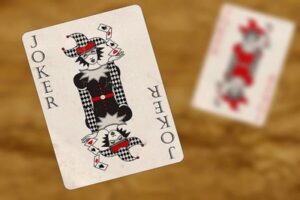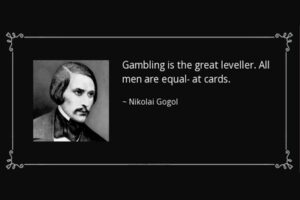 Gambling is an activity that many people enjoy in their spare time, with many of the sayings and phrases that you might associate with it being filled with expletives.
Gambling is an activity that many people enjoy in their spare time, with many of the sayings and phrases that you might associate with it being filled with expletives.
Thankfully, far more eloquent people than you or I have enjoyed a flutter in the past and have been able to put into words what many of us will have thought at one time or another, so we can turn to them for inspiration.
Of course, many of these quotes have simply adapted into the lexicon of modern day speech, meaning that we rarely, if ever, consider where they came from.
Why did someone advise someone else to ‘quit’ whilst they were ‘ahead’? Who was the first person to suggest that someone else is ‘a card’? In some cases it’s almost impossible to track down an answer, but that doesn’t mean that the saying is any less used.
Poker Face
 In 2008, Lady Gaga informed the world that they couldn’t read her poker face. Unsurprisingly, this wasn’t the first time that such an expression had been uttered, though it might well have been the first time that it was put to such a jaunty beat and memorable tune. In fact, the saying has been around for almost as long as the game of poker itself, though certainly since someone wanted to explain the game to others.
In 2008, Lady Gaga informed the world that they couldn’t read her poker face. Unsurprisingly, this wasn’t the first time that such an expression had been uttered, though it might well have been the first time that it was put to such a jaunty beat and memorable tune. In fact, the saying has been around for almost as long as the game of poker itself, though certainly since someone wanted to explain the game to others.
The oldest use of the phrase that anyone has been able to find was in a book explaining the game of poker, which was written in the 1870s. The phrase, of course, means to play something with a straight bat and give nothing away, which is important in poker as a means of bluffing an opponent into thinking that you’ve got better cards than they have and thereby winning the hand, despite having an inferior one.
The use of it in the modern world is common, such as in a New Yorker column about Michael Wolf when the author wrote, “That was too much for Brzezinski. At the best of times, she doesn’t have much of a poker face, and she had already been giving Wolff horrified sidelong glances.” In truth, it’s probably rarer for the saying to be used in respect of poker than it is other aspects of daily life.
A Card
 Whilst the youth of today would probably find far more colourful language to refer to someone that they know as being eccentric or tricky to deal with, most people would understand what you meant if you chose to refer to someone as ‘a card’. What many might not realise is that the saying was first used in a piece of work by Charles Dickens, who referred to someone as a ‘knowing card’ in his 1836 work ‘Sketches By Boz’.
Whilst the youth of today would probably find far more colourful language to refer to someone that they know as being eccentric or tricky to deal with, most people would understand what you meant if you chose to refer to someone as ‘a card’. What many might not realise is that the saying was first used in a piece of work by Charles Dickens, who referred to someone as a ‘knowing card’ in his 1836 work ‘Sketches By Boz’.
The full title of the piece is ‘Sketches by “Boz,” Illustrative of Every-day Life and Every-day People’, which might help to explain what it was about. It was in reference to a Mr Thomas Potter, who apparently had the aim of being known as a ‘knowing card’. It was used again in Bleak House, which is much better known by most and was released in 1852. The very notion emerged from the world of playing games with cards.
The idea of someone being dealt a ‘safe card’, a ‘sure card’ or the likes was common in Victorian England. In the modern era, it is far less common to refer to someone as being a ‘card’, but isn’t out of usage altogether by any means. The meaning of it in general will be different in how it is said, with some perhaps referring to the idea of someone being a joker, which obviously comes from that card within a pack.
The Harder You Work, The Luckier You Get
 The phrase ‘the harder I work, the luckier I get’ was popularised by South African golfer Gary Player, leading many to believe that it was him who originally came up with it. In actual fact, it it probably more likely to be the case that Player said it in a way that was pithy, clever and easy to understand, given that Thomas Jefferson was the first person to be on record as having said something similar.
The phrase ‘the harder I work, the luckier I get’ was popularised by South African golfer Gary Player, leading many to believe that it was him who originally came up with it. In actual fact, it it probably more likely to be the case that Player said it in a way that was pithy, clever and easy to understand, given that Thomas Jefferson was the first person to be on record as having said something similar.
The American president from 1801 to 1809 was believe to have once said, “I’m a great believer in luck and I find the harder I work, the more I have of it.” Even that is disputed, however, given that it didn’t appear in print until an 1947 edition of Reader’s Digest and at that stage was attributed to F. L. Emerson. The idea of Thomas Jefferson having said it didn’t come about until 1982, so was it even his quote?
Obviously these are the sorts of things that can almost certainly never be verified, which is why so many people are happy to suggest that it was Gary Player that originated it as an expression. Regardless, the suggestion is that you make your own luck and if you want to win at games of fortune then the best thing to do is to practice over and over and over again until luck becomes as common as being able to deal cards.
Quit While You’re Ahead
 There are numerous phrases that have emerged from the world of gambling and suggest a need to get out of the game before you lose all of your money, with ‘quit while you’re ahead’ being at the top of the list. It’s an obvious enough suggestion when you remember that the House always wins, so the only hope that you’ve got of staying in the black is to take your money and run when you get ahead.
There are numerous phrases that have emerged from the world of gambling and suggest a need to get out of the game before you lose all of your money, with ‘quit while you’re ahead’ being at the top of the list. It’s an obvious enough suggestion when you remember that the House always wins, so the only hope that you’ve got of staying in the black is to take your money and run when you get ahead.
The Chinese, ever a wise bunch, have a slightly more complex saying that is solid advice to gamblers: If you must play, decide upon three things at the start: the rules of the game, the stakes, and the quitting time. It was actually a Spanish Jesuit priest that is believed to have put the saying to print originally, with Baltasar Gracián living from 1601 until 1658 and using his time to write, “Quit while you’re ahead; all of the best gamblers do.”
Given that Gracián’s works were praised by the likes of Arthur Schopenhauer and Friedrich Nietzsche, it’s fair to say that he was held in high regard. His book, The Art of Worldly Wisdom, might not have too many insights that are all that useful in the modern era, but the idea of quitting while you’re ahead in any gambling endeavour is one that stands the test of time, which is why we’re all so prone to ignore it…
Put Your Money Where Your Mouth Is
 Have you ever been told to put your money where your mouth is? It’s not recommended, especially in a post-Covid world, given the lack of hygiene around the cleaning of bank notes. Of course, it’s not really intended as a literal suggestion, instead being a request to back up what you’re saying with action. It’s the sort of comment made on a poker table by someone hoping that another player will call their raise, for example.
Have you ever been told to put your money where your mouth is? It’s not recommended, especially in a post-Covid world, given the lack of hygiene around the cleaning of bank notes. Of course, it’s not really intended as a literal suggestion, instead being a request to back up what you’re saying with action. It’s the sort of comment made on a poker table by someone hoping that another player will call their raise, for example.
It’s believed that it started life in the United States of America in the 1930s before making its way over to the United Kingdom during World War II. It was such a popular saying that the British government used it as an advertising slogan for the National Savings Bank Accounts Department in 1975. It’s not clear whether or not it worked in encouraging people to bank their cash with the department, but it was worth a try.
Variations on the phrase had been around before even 1930, with ‘put your money where your interests are’ appearing in The Railroad Telegrapher in 1905 and ‘put his money where his heart is’ featuring in the April 1919 edition of The Harvester World. It’s likely that one or more of these phrases were then adapted to make the phrase we know and love today, giving gamblers a sentence to bait others with in competitive games.
Luck Will Change
 Bret Harte was born in August of 1836 and lived until May 1902, writing short stories and poems during his life. He became known for short stories about miners, gamblers and similar romantic figures during the Gold Rush in California. As he moved around the United States of America and over to Europe, Harte adapted his stories but will always be best remembered for his tales about the Gold Rush era.
Bret Harte was born in August of 1836 and lived until May 1902, writing short stories and poems during his life. He became known for short stories about miners, gamblers and similar romantic figures during the Gold Rush in California. As he moved around the United States of America and over to Europe, Harte adapted his stories but will always be best remembered for his tales about the Gold Rush era.
One of the works that he wrote included a phrase that quickly got adopted into the lexicon when he suggested that ‘the only sure thing about luck is that it will change’. As you might expect from someone that wrote about gambling and panning for gold, a number of Harte’s works included references to luck. ‘The Luck of Roaring Camp’ was the story that saw him reach nationwide fame in America, for example.
The idea that luck will change at some point is a solid mantra for gamblers, but it’s worth remembering that that works both ways. Many punters will bank on the idea of their bad luck changing and forget that their good fortune can change too. In fact, given that all games are set up to ensure that the House always wins, it’s more likely that your good luck will change than your bad.
Put Your Cards On The Table
 This is a saying that is easy to understand where it’s come from, given that pretty much every card game will require you to reveal what you’ve got if you hope to win. When it’s used away from casinos and card rooms the phrase generally means that you need to reveal your true intentions and be sure not to keep anything hidden. Essentially, it is a request to be clear and transparent in what you’re doing and saying.
This is a saying that is easy to understand where it’s come from, given that pretty much every card game will require you to reveal what you’ve got if you hope to win. When it’s used away from casinos and card rooms the phrase generally means that you need to reveal your true intentions and be sure not to keep anything hidden. Essentially, it is a request to be clear and transparent in what you’re doing and saying.
The idiom in question dates to the 1800s, quickly being adapted into ‘normal’ conversation and not just because a poker player has won a hand and has to prove it. Of course, players don’t have to prove their honesty if their stake isn’t called, but if it is then they might well find themselves in trouble if they’ve had their bluff called. That’s a whole different idiom, but it does come from the same sort of origin.
Rather than being a phrase that is linked to a specific person, the notion of putting your cards on the table appears to have grown out of the world of poker playing and was simply taken from there into the standard lexicon. Whether it be in business meetings or some other area of life, being asked to speak openly and honestly is perhaps something that we’ve forgotten about in a post-truth era.
All Men Are Equal At Cards
 Nikolai Vasilievich Gogol was a Russian writer, creating novels, scripts and even short stories. He also came up with the philosophical notion that all men are equal at cards, which is why ‘gambling is the great leveller’. It is, of course, completely true: when you’re involved in gambling you have just as much chance of winning as you do of losing and it doesn’t matter how rich or poor you are, that remains the case.
Nikolai Vasilievich Gogol was a Russian writer, creating novels, scripts and even short stories. He also came up with the philosophical notion that all men are equal at cards, which is why ‘gambling is the great leveller’. It is, of course, completely true: when you’re involved in gambling you have just as much chance of winning as you do of losing and it doesn’t matter how rich or poor you are, that remains the case.
In so many ways, this saying is one that grows in sense the more that you think about. A pauper and a king could sit down at a roulette wheel and the pauper would be just as likely as the king to walk away with a fortune at the end of the day. It’s the gambling equivalent of the saying ‘all men are created equal’, suggesting that privilege is irrelevant when you sit down at a casino and look to see if you can turn your fortune.
It’s fair to say that the quote does have a slight fault in it, which comes in the form of the fact that those that practice can put themselves in a more advantageous than others. A world class poker player who spends his life in card rooms will be more likely to win a hand than a beginner, but the point is that nothing is every guaranteed. Beginner’s luck is real, so if you face the wrong person then even the number one in the world will be equal at the table.